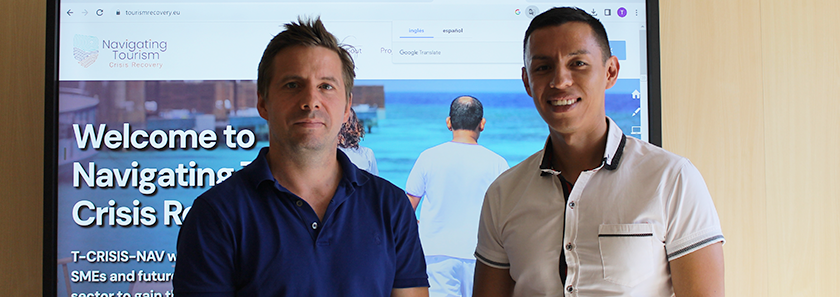Emmanuel Soriano and Thomas Prola, FUNIBER researchers and participants of the Erasmus Plus CBHE LOVE.DIST@ANCE project (Learning Optimization and Academic Inclusion Via Equitable, Distance Teaching and Learning) have published an article in the journal MLS Educational Research (MLSER), focused on the validation and possible re-adaptation of the Distance Education Learning Environments Survey (DELES) instrument for assessment in Virtual Learning Environments (VLE).
Specifically, the research aimed to assess the use of the DELES instrument for the evaluation of EVA in the distance education project and inclusion approach towards vulnerable groups LOVE.DIST@NCE, in addition to considering its possible redesign and updating, due to the age of the tool, created and validated in 2005, and the lack of a DELES approach towards inclusive education.
Data collection was carried out in the framework of a transnational working meeting at Levinsky University, Tel Aviv, Israel, held in April 2022. Three teams of 9 members each were formed. The participants were educational experts, leaders and academics from 3 different countries: 13 from Israel, 3 from Portugal and 11 from Georgia.
The results obtained from the experts’ assessment conclude that the DELES is a suitable evaluation instrument for the LOVE.DIST@NCE project, although qualitative nuances of improvement have been perceived in each scale. If you want to know more about this fascinating study and the improvements proposed in the instrument, the full article is available at the following link.
The study also considers the possibility of studying other tools in the future, taking into account that these mechanisms must evolve as educational technologies and Virtual Learning Environments (VLE) are updated.
The Erasmus Plus CBHE LOVE.DIST@NCE (Learning Optimization and Academic Inclusion Via Equitable, Distance Teaching and Learning) project aims to contribute to improving access to and quality of higher education for socially vulnerable people in Israel and Georgia, and is funded by the European funding agency EACEA (Education, Audiovisual and Culture Executive Agency).
Within the project, the structure and infographics of an online course were designed. This can be used by teachers who are developing distance courses with digital contents and resources, using different communication and evaluation tools.
The project ended last year. All participating institutions have signed a letter of commitment in order to reinforce the initiatives generated during the project, share experiences and involve a greater number of teachers and students in the coming years, among other actions.

Disclaimer: The European Commission’s support for the preparation of this publication does not constitute an endorsement of its contents, which reflects the views only of the authors, and the Commission cannot be held responsible for any use which may be made of the information contained therein.
